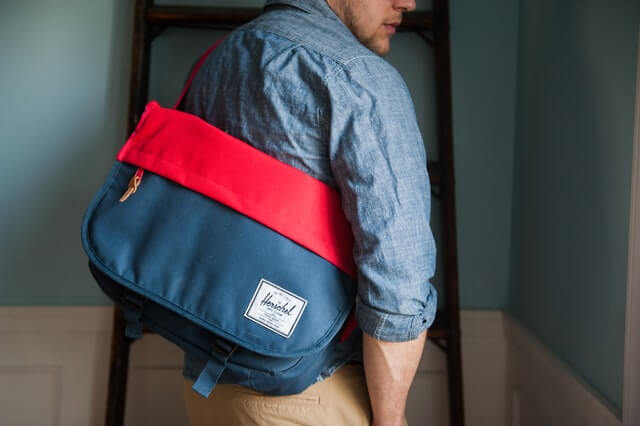There are several ways to say carry in Thai.
The word you use depends on the action, the amount, or the weight of the object(s).
Watch my video explaining this topic here:
ถือ tĕu
ถือ means to hold. It’s usually used with small objects like a cellphone or a handbag. In fact, the word phone in Thai is มือถือ (meu tĕu) which literally translates to hand-hold. Let’s take a look at some examples:
Examples:
- Can you hold my phone for a second? I’m tying my shoes.
ช่วยถือมือถือแป็บนึงนะ ฉันกำลังผูกเชือกรองเท้า
chûay tĕu meu tĕu bpàep neung ná · chăn gam-lang pòok chêuak rong táo - You are holding your handbag like that, be careful with thieves.
ถือกระเป๋าแบบนั้นระวังโดนคนขโมยนะ
tĕu grà-bpăo bàep nán rá-wang dohn kon kà-moi ná
ยก yók
ยก means to lift. Usually, you lift with two hands because the object is usually heavy. In fact, the word for weight-lifting is ยกน้ำหนัก. Literally, lift weight.
Examples:
- Help me lift the bed. I think I dropped something under the bed.
ช่วยยกเตียงขึ้นหน่อย คิดว่าทำของตกใต้เตียง
chûay yók dtiang kêun nòi · kít wâa tam kŏng dtòk dtâi dtiang - Help me lift the box. I can’t lift it.
ช่วยยกกล่องนี้ขึ้นหน่อยคะ ฉันยกไม่ไหว
chûay yók glòng-née kêun nòi ká · chăn yók mâi wăi
ขน kŏn
When you move out of your house and you have to carry all the furniture to the back of the car. Then the car has to carry all these things to your new home. This big action of carrying/transporting is called ขน and the thing you are carrying usually requires more than one person.
Examples:
- Help me move these things from here.
มาช่วยกันขนย้ายของออกไปจากที่นี่หน่อย
maa chûay gan kŏn yáai kŏng òk bpai jàak têe nêe nòi - Right now I am moving things out of my house. If you are free, help me.
ตอนนี้ฉันกำลังขนของย้ายบ้านอยู่ ถ้าเธอว่างก็มาช่วยได้นะ
dton-née chăn gam-lang kŏn kŏng yáai bâan yòo · tâa ter wâang gôr maa chûay dâai ná
อุ้ม ûm
When you carry a child or an animal in your embrace with your two arms holding it close to your body. This action of carrying is called อุ้ม ûm.
Examples:
- Don’t let strangers carry the child.
อย่าให้คนไม่รู้จักอุ้มลูกเรานะ
yàa hâi kon mâi róo jàk ûm lôok rao ná - This cat likes to be held.
แมวตัวนี้ชอบให้อุ้ม
maew-dtua-née chôp hâi ûm
ขี่หลัง kèe lăng
To carry someone on your back (piggyback), in Thai we literally say to ride on the back. ขี่ (kèe) means to ride, หลัง (lăng) means the back (of the body).
Examples:
- When I was a kid, I liked riding piggyback on my dad.
ตอนฉันเด็ก ฉันชอบขี่หลังพ่อ
dton chăn dèk · chăn chôp kèe lăng pôr - I really hurt my leg. I can’t walk. Can I ride piggyback?
เจ็บขาจริงๆ เดินไม่ไหวแล้ว ขอขี่หลังได้ไหมคะ
jèp kăa jing jing · dern mâi wăi láew · kŏr kèe lăng dâai măi ká
แบก bàek
แบก means to carry a heavy object on the shoulder.
For example, imagine a street merchant who carries Thai snacks/food in a container with a wooden bar that goes across her shoulder. Or, imagine Jesus carrying the cross. It’s that action of carrying something heavy. Usually, requiring both hands.
Examples:
- Carrying heavy things like that, be careful you hurt your shoulder.
แบกของหนักอย่างนั้นระวังไหล่เสียนะ
bàek kŏng nàk yàang nán rá-wang lài-sĭa ná - Dad, are you tired? I’ll help you carry the rice bag.
ป้าคะ เหนื่อยไหม เดี๋ยวหนูแบกถุงข้าวสารให้
bpâa ká · nèuay măi · dĭeow nŏo bàek tŭng kâao săan hâi
สะพาย sà-paai
สะพาย means to carry an object (like a bookbag, satchel) with straps on your shoulder. It can be one strap or two straps, the point is that the strap is across your shoulder.

Examples:
- สะพายกระเป๋าหลังไม่ดีต่อกระดูกสันหลัง
sà-paai grà-bpăo-lăng-mâi-dee dtòr grà-dòok săn lăng - ฉันจะสะพายกระเป๋าเป้ · ท่องเที่ยวไปทุกที่
chăn jà sà-paai grà-bpăo bpây · tông tîeow bpai túk têe
หาม hăam
Imagine a soccer player or a boxer who got hurt and has to be put on a stretcher and get carried to the hospital. This type of carrying on a stretcher, usually to the hospital, is called หาม.
Examples:
- Ronaldo is badly injured. People have to carry him to the hospital.
โรนัลโด้เจ็บหนักต้องมีคนหามส่งโรงพยาบาล
roh-nan-dôh-jèp-nàk dtông mee kon hăam sòng rohng pá-yaa-baan - There was an accident. The drivers had to be carried to the hospital.
เกิดอุบัติเหตุขึ้น คนขับรถได้ถูกหามส่งโรงพยาบาลแล้ว
gèrt ù-bàt-dtì-hàyt kêun · kon kàp rót dâai tòok hăam sòng rohng pá-yaa-baan láew
หิ้ว hîw
This means to carry something light that has a handle and you can insert in your finger and walk around with it. Small and light objects like a plastic bag, a lunch box that has a handle, etc.
Examples:
- Some kids carry lunch box to school.
เด็กๆบางคนหิ้วปิ่นโตเดินไปโรงเรียน
dèk dèk baang kon hîw bpìn dtoh dern bpai rohng rian - Don’t carry the bag with one finger, you will hurt your finger.
อย่าหิ้วถุงด้วยนิ้วเดียวสิ เดี๋ยวก็เจ็บนิ้วหรอก
yàa hîw tŭng dûay níw dieow sì · dĭeow gôr jèp níw ròk
พก pók
พก (pók) is to carry something in your pocket – like carrying money or a gun.
A good word to know is พกพา (pók paa) which means portable.
Examples:
- The government prohibits people carrying guns.
รัฐบาลห้ามคนพกปืน
rát-tà-baan hâam kon pók bpeun - What are you carrying in your wallet?
พกอะไรในกระเป๋าตังค์
pók à-rai nai grà-bpăo dtang
I hope now you all know how the different ways to say to carry in Thai. Please go out and carry stuff!

